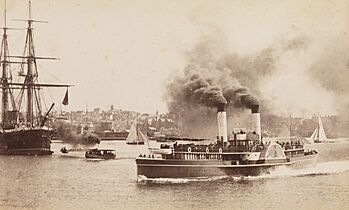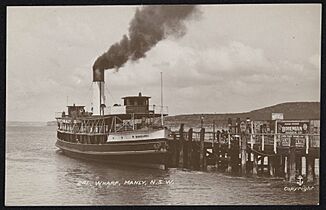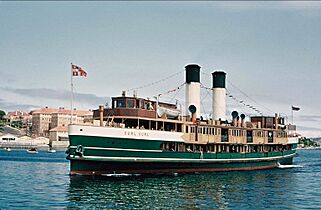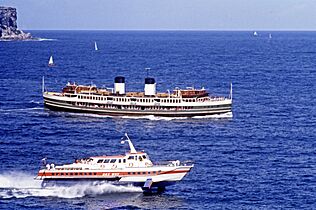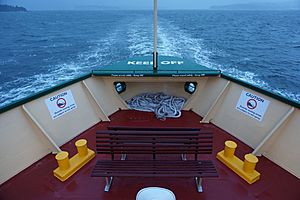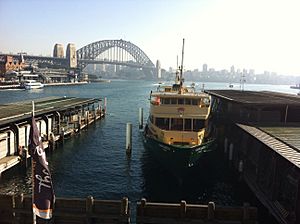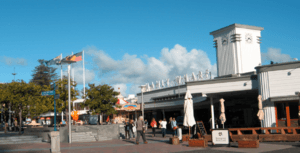Manly ferry services facts for kids
 |
||||||||||||
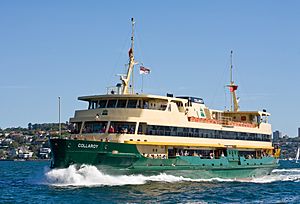
Collaroy in November 2008
|
||||||||||||
| Waterway | Sydney Harbour | |||||||||||
|---|---|---|---|---|---|---|---|---|---|---|---|---|
| Owner | Sydney Ferries | |||||||||||
| Operator | Transdev Sydney Ferries | |||||||||||
| System length | 2 wharves, 11.3km (7mi) | |||||||||||
| No. of vessels | 2 Freshwater class; 3 Emerald class (Current), 3-4 Freshwater Class (Future) | |||||||||||
|
||||||||||||
The Manly ferry service (also called F1) is a well-known way to travel across Sydney Harbour. It connects the fun suburb of Manly with Circular Quay in the city center. This journey is about seven nautical miles long, which is roughly 13 kilometers.
Contents
History of Manly Ferries
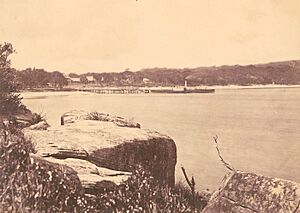
The Manly ferry service began in 1853. A man named Henry Gilbert Smith used a wooden paddle boat called Brothers. He wanted to bring people to Manly to help sell his land there. Manly quickly became a popular spot for weekend trips. More ferries were soon added to meet the demand.
In 1859, the Phantom started service. It was the first double-ended ferry, meaning it could go forwards or backwards without turning around. This design was very successful and is still used today. As more people visited Manly, bigger and better ferries were needed.
In 1881, the Port Jackson & Manly Steamship Company was formed. This company ordered the biggest paddle steamer ferry ever on the harbour, the grand Brighton. It started service in 1883.
Around 1892, a fare war started. The Port Jackson company raised its prices. So, some Manly residents created their own company. They offered cheaper tickets. Eventually, the two companies joined together in 1896. They formed the Port Jackson Co-operative Steamship Company.
Walter Reeks, a famous ship designer, created new ferries for the service. These designs became the standard for all Manly ferries that followed. The Manly (II) in 1896 was the first double-ended ferry to use screws (propellers). The Kuring-gai in 1901 was a steel, double-ended screw steamer. It looked and felt like the familiar Manly ferries of the 1900s.
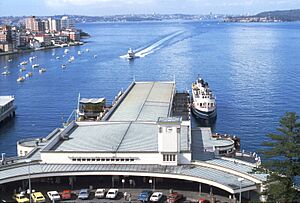
To handle more passengers, six similar double-ended screw steamers were built. These included Binngarra (1905) and Bellubera (1910). In 1928, two new, larger ferries, Curl Curl and Dee Why, arrived from Scotland. They were the biggest and fastest ferries until 1938. That's when the famous South Steyne, also built in Scotland, joined the fleet.
Many older ferries were taken out of service in the 1960s and 1970s. The Port Jackson and Manly Steamship Company sold the service in 1972. By 1974, the NSW State government took over. In the 1980s, the Freshwater-class ferries were introduced. These new ferries replaced older ones like Baragoola.
In the mid-1960s, faster hydrofoil services began. They cut travel time in half but cost more. Hydrofoils were replaced by Jetcats in 1990. However, Jetcats were not reliable. They were replaced by the current Manly fast ferry service. Since 2015, Manly Fast Ferries has operated this speedy service.
In 2013, the Manly Ferry was officially named F1. This was part of a plan to number all ferry, train, and light rail lines in Sydney.
In 2019, plans were announced to replace the large Freshwater class ferries. Three new, smaller Emerald Class ferries were planned to offer more frequent trips. These new ferries are named Clontarf, Balmoral, and Fairlight.
However, due to public demand, some Freshwater ferries will stay in service. In 2020, it was announced that Collaroy would remain until at least 2023. Then, in 2021, Freshwater was also saved. Queenscliff was retired in October 2021. There were rumors about Narrabeen being scrapped, but it was later announced that it would get new engines.
In 2023, plans were announced to bring all four Freshwater ferries back into full service. This means the Emerald-class ferries might be moved to other routes.
-
South Steyne and hydrofoil Dee Why passing North Head in 1970.
How the Ferries Operate
Transdev Sydney Ferries runs the Sydney Ferries network. Transport for NSW plans the routes, timetables, and branding for the services. During summer holidays, the Manly Ferry uses a special timetable. This adds more services to handle the many tourists.
Freshwater Class Ferries
The Freshwater class ferries are the large, traditional Manly ferries. There are four of them: MV Freshwater, MV Queenscliff, MV Narrabeen, and MV Collaroy. They were built between 1982 and 1988 in Newcastle and Tomago.
These ferries are 70 meters (230 feet) long and 12.5 meters (41 feet) wide. They can carry 1,100 passengers and travel at 16 knots (about 30 kilometers per hour). Their lower part is made of steel, and the upper cabin is made of aluminum.
In 2019, there were plans to retire all four Freshwater ferries. They were to be replaced by new versions of the smaller Emerald-class ferries. However, many people wanted to keep the Freshwater ferries. So, two of them, Freshwater and Collaroy, were saved. Queenscliff was retired in October 2021. Narrabeen was also retired, as engine replacement was too costly.
Currently, two Freshwater ferries operate mainly on weekends and public holidays. They are also used when the waves are too big for the Emerald-class ferries. In 2023, plans were announced to bring all four Freshwater ferries back into full-time service.
Emerald Class Ferries
Three Emerald-class ferries currently run the Manly ferry service. Their names are Fairlight, Balmoral, and Clontarf. These ferries are a newer design. They have special hulls to help them cross the open waters of Sydney Harbour.
The Emerald-class ferries are expected to be moved to other routes once the Freshwater ferries are fully back in service.
Ferry Wharves
<mapframe width="350" height="300" align="center" text="Wharves served by the F1 ferry" longitude="151.2477" latitude="-33.8326" zoom="12"> [ { "type": "ExternalData", "service": "page", "title": "Circular Quay ferry wharf.map" }, { "type": "ExternalData", "service": "page", "title": "Manly ferry wharf.map" } ] </mapframe>
Circular Quay Wharf
Manly ferries use Wharf 3 at Circular Quay. This wharf is designed for easy boarding on both levels of the ferry. This helps ferries load and unload passengers quickly.
Manly Wharf
This wharf is in Manly, right across from The Corso. It also allows passengers to board on both levels of the ferry. The "B" side of the wharf is used by Manly Fast Ferries. Other companies like My Fast Ferry and Captain Cook Cruises use the nearby Manly Hotel wharf for hop-on/hop-off tours.
Local bus services leave from stands in front of the wharf. They connect to many other suburbs in the Northern Beaches area.
Passenger Numbers
The table below shows how many people used the Sydney Ferries network for the year ending June 30, 2022.
|
F1
|
3 300 000 | |
|
F2
|
1 034 000 | |
|
F3
|
1 982 000 | |
|
F4
|
3 130 000 | |
|
F5
|
421 000 | |
|
F6
|
581 000 | |
|
F7
|
171 000 | |
|
F8
|
464 000 |
 | Victor J. Glover |
 | Yvonne Cagle |
 | Jeanette Epps |
 | Bernard A. Harris Jr. |


